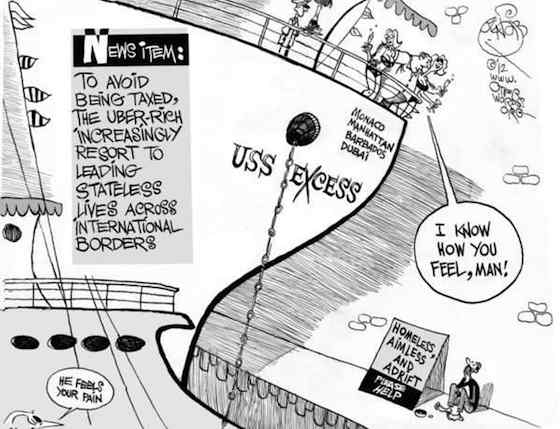- MENU
- HOME
- SEARCH
- WORLD
- MAIN
- AFRICA
- ASIA
- BALKANS
- EUROPE
- LATIN AMERICA
- MIDDLE EAST
- United Kingdom
- United States
- Argentina
- Australia
- Austria
- Benelux
- Brazil
- Canada
- China
- France
- Germany
- Greece
- Hungary
- India
- Indonesia
- Ireland
- Israel
- Italy
- Japan
- Korea
- Mexico
- New Zealand
- Pakistan
- Philippines
- Poland
- Russia
- South Africa
- Spain
- Taiwan
- Turkey
- USA
- BUSINESS
- WEALTH
- STOCKS
- TECH
- HEALTH
- LIFESTYLE
- ENTERTAINMENT
- SPORTS
- iHaveNet.com: World
By Sam Pizzigati

Back in 1863, a short story took the American reading public by storm. Edward Everett Hale's The Man without a Country told the tale of a poor treasonous soul sentenced to spend the rest of his life endlessly sailing the world in perpetual exile, as a prisoner aboard Navy warships.
Today's awesomely affluent are just as transient — by choice.
Take Facebook co-founder Eduardo Saverin. This billionaire renounced his U.S. citizenship in 2011, a move perfectly timed to potentially save him hundreds of millions in taxes when Facebook goes public.
Saverin has plenty of company. The number of Americans who formally renounced their U.S. citizenship soared to 1,780 last year from 235 in 2008.
The spark for this surge?
U.S. tax officials have been clamping down on overseas tax evasion. This bit of unpleasantness has some wealthy Americans, such as the Brazilian-born Saverin, cutting their ties to dear old Uncle Sam. They simply pay a $450 paperwork fee and an "exit tax" on unrealized capital gains, if they hold assets worth over $2 million or have paid over $151,000 to the IRS in any recent year.
But the affluent who've formally renounced their citizenship comprise just a tiny share of what the Financial Times has labeled the "stateless super rich." These uber-wealthy folks shy from the notoriety of citizenship spurned. They just live their lives as if they have no nation to call their own.
The most famous member of this stateless-by-choice community may be Nicolas Berggruen, a 52 year-old "homeless billionaire" worth over $2.3 billion who has spent the last decade hopping the world from one five-star hotel to another.
But few of the stateless super rich settle for hotel suites. Most of the vagabonding wealthy own personal residences. Lots of them. Typically, the Financial Times reported last month, a stateless super-rich household will have one or two properties in their "country of principal residence," another in London, New York, or some other "global city," a "holiday home" in a warm climate, and maybe another pad somewhere snowy.
Among the super rich, this perpetual-motion existence has become almost de rigueur, notes Jeremy Davidson, a London realtor who handles properties that run at least £10 million, the equivalent of over $16 million.
"The more money you have," explains Davidson, "the more rootless you become because everything is possible."
That rootlessness is keeping the price of luxury real estate soaring. So far this year, in Manhattan alone, four luxury co-op apartments have sold for over $30 million each, notes Crain's New York Business.
Just how many potential stateless super rich are currently roaming the world? Late last year, the Singapore-based Wealth-X consulting firm put the overall global number of people worth at least $500 million at about 4,650. These super rich together hold an estimated $6.25 trillion in assets.
That's more than enough, note urban planners, to create havoc in the hotspots where the stateless super rich most often gather. Their gentrification on steroids supersizes prices for local products and services — and prices out local residents in the process.
The massive mansions and apartments belonging to these homeless billionaires can also exacerbate local housing shortages and constitute an assault on any healthy sense of urban community. The super rich, as they flit about, leave their properties unoccupied most of the year. The resulting emptiness, notes Columbia University sociologist Saskia Sassen, sucks the neighborhood vitality out of great urban centers.
The super rich don't notice. Or care. They have no interest in putting down roots. During their brief seasonal sojourns, they live in isolation from the greater community around them. They venture out into local public life only long enough to corrupt it with trinkets for local pols who promise to keep tax rates toothless.
The stateless protagonist in the classic short story Edward Everett Hale penned nearly 150 years ago desperately yearns to rejoin the society he so treasonously spurned. Today's stateless super rich don't figure to display any similar yearning. They're having too grand a time. At our expense.
WORLD | AFRICA | ASIA | EUROPE | LATIN AMERICA | MIDDLE EAST | UNITED STATES | ECONOMICS | EDUCATION | ENVIRONMENT | FOREIGN POLICY | POLITICS
No Country for Rich Men